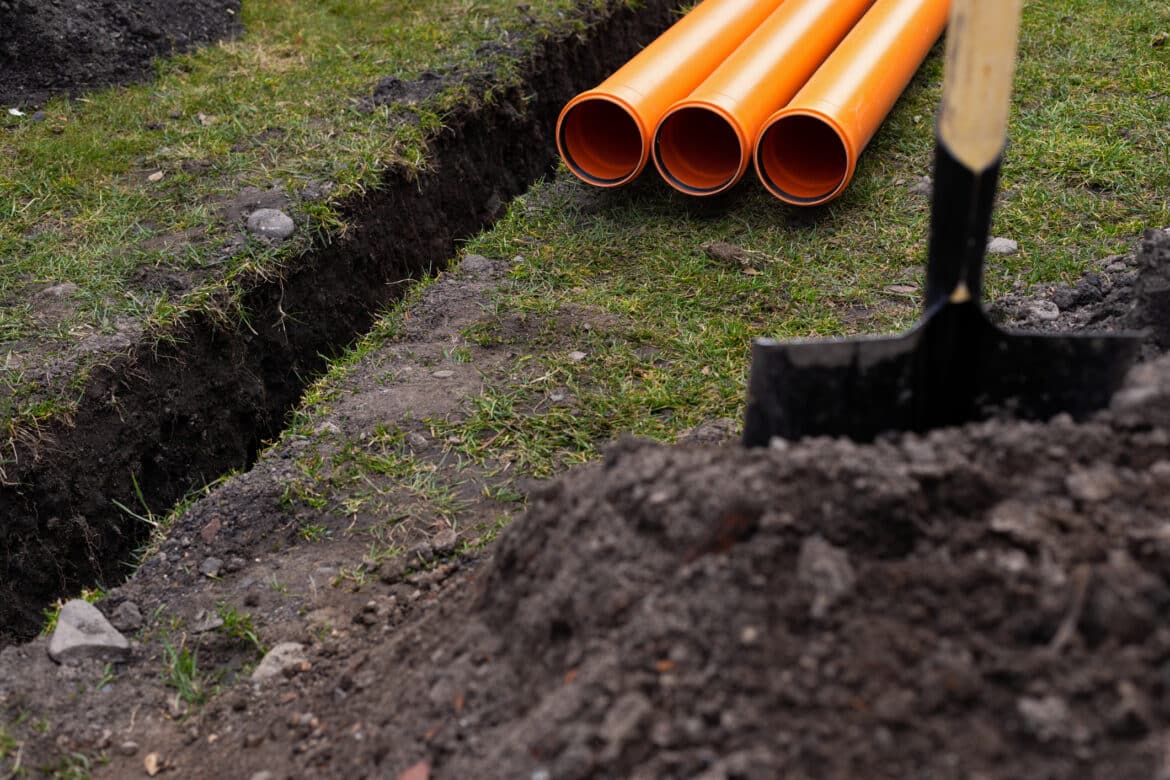
How Soil Types in Houston Affect Plumbing Systems
Plumbing systems in Houston face issues because of the area’s soil. The expansive clays in Houston black soil tend to shrink and swell, which can mess with pipe stability. Knowing how these soils behave is key to installing and maintaining plumbing. By checking out the soil conditions and working with expert plumbers, you can reduce the risks to your plumbing systems.
Why Soil Types Matter
Did you know soil types can really affect piping networks, especially in spots like Houston Heights?
The ground here has a lot of Houston black soil, and it plays a big part in this.
This kind of soil is full of clay that expands with water and shrinks when dry, unlike sandy or loam soils.
Picture a rubber band being stretched and let go again and again—this is similar to what your pipes go through with each shift.
The Houston black soil supports different grasses, giving some stability but also putting pressure on plumbing structures.
Its rich nutrients are valuable for local agriculture, which impacts construction and plumbing work.
For folks in Houston Heights, knowing about these soil traits is key.
It’s not just about putting in pipes and being done with it; it’s about knowing how local soil conditions can affect how long your plumbing systems will last and how well they will work.
Get help from experts like bluefrog Plumbing + Drain of West Houston to handle these special challenges the right way.
Soil Types Affecting Plumbing Systems
Houston Heights has different soil types that affect plumbing systems.
Knowing these types is key for good plumbing work.
Clay soils are common here.
They expand and shrink with water, like Houston black soil.
This can put pressure on pipes, making them crack or leak.
Soils like these change with moisture, which affects stability.
Sandy soils are different.
They drain well but aren’t stable.
Extra support might be needed to keep pipes secure.
Unlike clay, sandy soils can drain too fast, which might erode the area around pipes and affect their position.
Loam soils are a mix of sand, silt, and clay.
They allow for stable drainage and put less stress on plumbing systems.
This makes them a preferable choice for maintaining plumbing integrity.
Knowing these soil types helps both homeowners and pros to take the right steps to avoid issues in Houston Heights.
How Clay Soils Impact Plumbing Systems

Clay soils, like those in the Houston Heights region, can significantly influence plumbing networks because of their unique properties.
Clay rapidly absorbs water, swelling when wet and shrinking when dry.
This expansion and contraction cause ground shifts, putting stress on underground pipes.
As your home’s foundation moves, so too does the plumbing infrastructure.
Pipes may become misaligned or even break due to this continual pressure, often leading to leaks and clogs.
It’s essential to monitor these conditions closely to avoid expensive repairs.
It’s not just about installing plumbing systems; it’s about ensuring its longevity.
Establishing a robust system in these areas requires expertise—something bluefrog Plumbing + Drain of West Houston specializes in.
They understand how to tackle these challenges with solutions designed for the local soil.
Proper installation and regular maintenance can help minimize the impact of clay soil on plumbing.
Using high-quality, flexible materials and allowing for adjustments can help safeguard your home’s plumbing against the soil behavior typical in Houston Heights.
Sandy Soils and Plumbing Challenges
Sandy soils in Houston Heights can cause issues for plumbing systems.
The main problem is with drainage.
Sandy soil lets water flow through it fast.
This might sound good, but it can also mean losing too much water around pipes.
When water moves quickly through sandy soils, it can wash away the ground and cause pipes to shift or settle unevenly.
Another problem is keeping pipes stable.
Sandy soil doesn’t hold together like clay or loam, so it supports pipes less.
Without enough support, pipes can sag or shift due to soil movement.
This can cause leaks, breaks, or other costly repairs.
Plus, because sandy soil absorbs and releases water quickly, plumbing systems might feel more pressure during heavy rains.
When the ground dries out during hot weather, it might not support pipes well, leading to misalignment or breaks.
To address these issues effectively, it’s important to consult with plumbing experts who can reinforce pipe installations and use strategic drainage management to protect your plumbing setup.
Bluefrog Plumbing + Drain of West Houston can offer professional solutions tailored to these unique soil challenges.
Why Loam Soils Are Good for Plumbing
Loam soils are great for plumbing systems, especially in places like Houston Heights.
Unlike clay soils, loam has a good balance that helps water drain well, so it doesn’t pool around pipes.
This mix reduces the chance of water damage because loam’s mix of sand, silt, and clay makes sure water drains just right—not too fast or slow.
This balance helps keep plumbing secure from pressure.
Loam is also full of nutrients, helping plants like blue grama and little bluestem grow.
These plants make the soil more stable, reducing shifts and stress on pipes, which lowers the chance of bursts or leaks.
The texture of loam also lessens erosion, which is important for keeping pipes secure.
Whether you’re installing or doing maintenance, choosing a spot with loam soil can save money and trouble over time.
At bluefrog Plumbing + Drain of West Houston, our experts understand these benefits and incorporate them when planning and maintaining plumbing systems that fit the Houston Heights area.
Knowing Your Soil Type for Better Plumbing
To set up high-quality plumbing systems, you need to know what kind of soil you have.
In Houston Heights, different soils call for varied plumbing approaches.
To find out what kind of soil you’re dealing with, experts use methods like core sampling and soil probes.
This helps determine if the soil is clay, sandy, or loam, each of which requires its own plumbing strategy.
When installing plumbing, key factors to keep in mind are soil moisture, compaction, and expansion or contraction tendencies.
For example, the clay soils common in Houston get bigger when wet and smaller when dry, which can put a lot of stress on pipes.
Sandy soils, on the other hand, can make stability and drainage tricky, often needing special solutions like extra pipe support.
bluefrog Plumbing + Drain of West Houston knows how crucial it is to get professional assistance with these issues.
An expert ensures installations are durable and suitable for the unique challenges in Houston Heights.
Planning ahead like this keeps plumbing systems in top shape, reduces future repair costs, and ensures efficient functionality.
Count on expert advice for solutions that stand the test of time.
How Soil Movement Affects Plumbing Systems
In regions such as Houston Heights, where clay soils are common, it’s crucial to be aware of soil shifts to maintain effective plumbing systems.
Clay soil shrinks when dry and swells when wet.
This movement puts stress on pipes underground, which can cause breaks or leaks.
Preventing soil movement can help keep pipes in good shape.
For folks in Houston Heights, working with experts like bluefrog Plumbing + Drain of West Houston can be reassuring.
They know how to deal with the area’s soil issues, offering solutions to guard your home’s plumbing from the constant shifts of the ground beneath you.
How Professional Plumbers Help with Soil Problems
When dealing with Houston Heights’ tricky soil, it’s smart to hire pro plumbers like bluefrog Plumbing + Drain of West Houston.
These experts understand how the soil affects plumbing systems, especially with the clay soil common in the area.
The ground here can shrink and swell, so you need a careful plan to maintain your pipes effectively.
Plumbers in the Houston Heights community know the soil well.
They can adjust plumbing solutions to fit local challenges.
Their know-how helps them offer custom services, ensuring your system is durable.
These pros use their skills to apply the best techniques and materials for soil-related plumbing problems.
They carefully assess the soil and suggest fixes to prevent issues like broken or misaligned pipes caused by soil movement.
By using their tools and expertise, they manage soil problems effectively, keeping homeowners safe from major plumbing surprises.
Working with trusted professionals ensures your plumbing systems not only handle today’s needs but are also prepared for future soil issues.
New Plumbing Solutions for Soil Challenges
Houston’s changing soil, especially in spots like Houston Heights, calls for smart systems.
New materials like polyethylene and PEX pipes are leading the way.
These pipes bend better and handle the stress from soil shifts.
They can take the expansion and shrinking of clay soils, cutting down on the chance of breaks.
Another new method is trenchless technology, which lets professionals fix or replace pipes without a lot of digging.
This is great for reducing the impact of soil movement without tearing up the ground.
Smart plumbing gadgets are key too.
Sensors and IoT tools help professionals keep an eye on plumbing systems in real-time.
They warn homeowners about problems like leaks or changes in pressure due to soil.
This means issues can be fixed early, preventing bigger problems.
These tools make these systems not just smart, but also safe, by providing useful insights.
As Houston Heights grows, using these new ideas is crucial for maintaining strong plumbing systems that last through tough soil conditions.
How Season Changes Affect Plumbing Systems
In Houston Heights, the weather can really mess with plumbing systems.
The heat in summer makes pipes expand, which can cause cracks or leaks.
In cooler months, pipes shrink and get brittle, upping the risk of damage when it gets cold fast.
Get Ready Early: Regular checks by experts like those from bluefrog Plumbing + Drain of West Houston can spot weak spots before they turn into big problems.
Insulating pipes helps stop freeze damage.
Keeping an eye on and adjusting pressure can help deal with shifting soil.
The clay-rich soil in this region is tricky because it shrinks and swells with moisture.
A strong plumbing setup is needed to handle these changes.
By getting ready for seasonal shifts, homeowners can keep their plumbing in good shape all year long.
Plumbing Systems in Houston Heights face some unique issues because of the shifting soils in the area.
One big problem is pipe damage from soil expanding and contracting, which can cause leaks and wastewater.
To tackle this, bluefrog Plumbing + Drain of West Houston uses flexible pipe materials.
These pipes handle soil pressure changes better and cut down on the chance of breaks.
This makes the system more robust and cuts down on how often it needs fixing.
In sandy soils, keeping pipes stable is a challenge because the ground can move easily.
Bluefrog’s team uses strong anchoring methods to keep pipes in place, even when the earth moves a bit.
These techniques help make the plumbing last longer and show how important it is to have experts who know local soil issues.
People in Houston Heights also get customized maintenance plans to deal with the area’s weather and soil.
Regular checks and early upgrades let homeowners catch issues before they get big, ensuring problems are fixed quickly.
This proactive approach highlights why it’s good to work with skilled professionals to protect homes from the ever-changing Houston soils.
Preparing Plumbing Systems for Soil Changes
Designing plumbing that lasts is key, especially with Houston Heights’ shifting soil.
New design ideas focus on flexible infrastructure that adapts to the soil’s movement.
Using expandable pipes is one way to let pipes flex without cracking or breaking.
Regular upkeep is crucial for a strong plumbing systems.
It’s smart to schedule regular check-ups with services like bluefrog Plumbing + Drain of West Houston to keep everything in top shape.
These check-ups can spot problems early, cutting down on costly fixes later.
Adding smart monitoring tech to the network can alert homeowners to soil movement that could harm their pipes.
Knowing early allows for quick fixes, saving time and reducing complications.
As soil shifts, having a solid, adaptable plumbing system in Houston Heights not only protects homes but also boosts property value.
Remember, making plumbing last is about more than just the first setup—it’s about ongoing care and smart planning.
By following these steps, you ensure your plumbing is reliable and worry-free for years.
How Locals Adapt
In Houston Heights, homeowners have found smart ways to keep their plumbing systems strong despite tricky soil.
Many work with bluefrog Plumbing + Drain of West Houston for regular checks and upkeep.
These partnerships are key, especially with the clay soil here that expands and shrinks, affecting plumbing.
Locals share tips at community meetings.
One popular idea is to plant native grass to keep soil steady so pipes aren’t stressed.
Keeping the soil moist helps too, and smart use of irrigation systems is part of that.
In this community, folks know that teaming up works best.
While expert help is crucial, residents are proud of their joint efforts to deal with plumbing challenges.
Through shared tips and solid partnerships, they keep their systems strong and dependable, even with tough soil conditions.
Frequently Asked Questions

How does the soil type affect plumbing in Houston Heights?
The clay-rich soil in this area can make pipes expand and shrink, putting stress on them.
What problems do sandy soils cause for pipe infrastructure?
Sandy soil can lead to drainage problems and unstable pipes because it’s loose. It’s important to reinforce plumbing well in these areas.
Is loam soil good for water systems in this region?
Yes, loam soil provides good drainage and doesn’t put much pressure on pipes, making it a great base for pipe networks.
Why do you need professional skills for waterworks in Houston Heights?
Pro plumbers know the local soil and can give the best fixes for the unique soil issues in this neighborhood.
What can residents do to monitor soil-related issues with their pipework?
Regularly scheduled inspections by professionals can help identify issues early. Using strong materials suited to local conditions can also help maintain plumbing integrity.





;)


